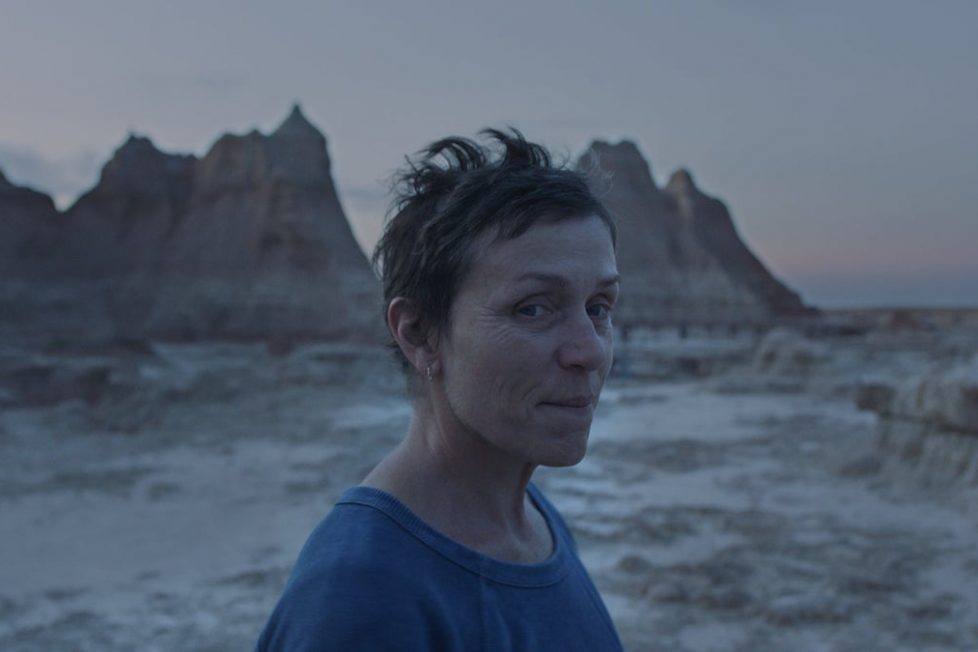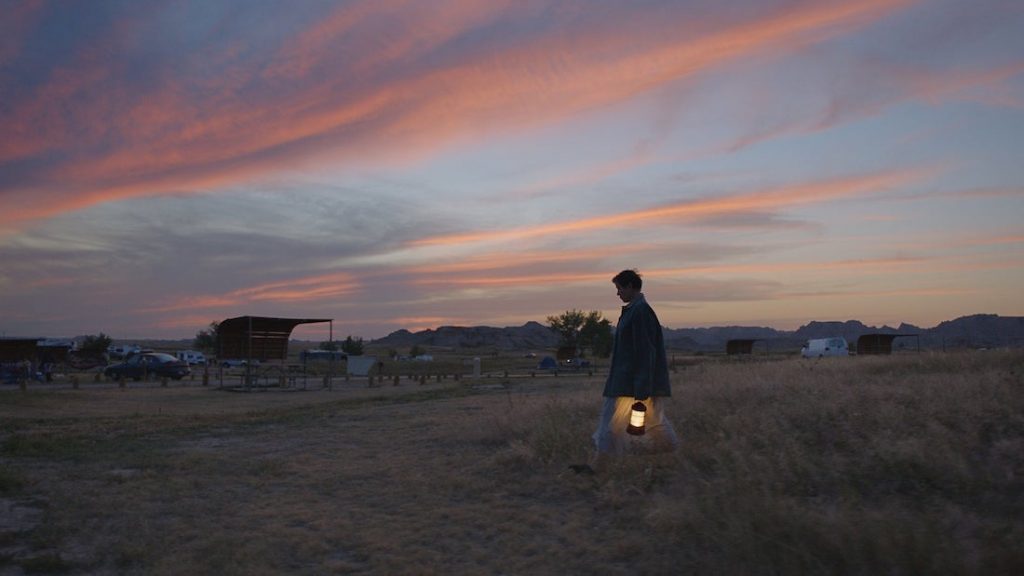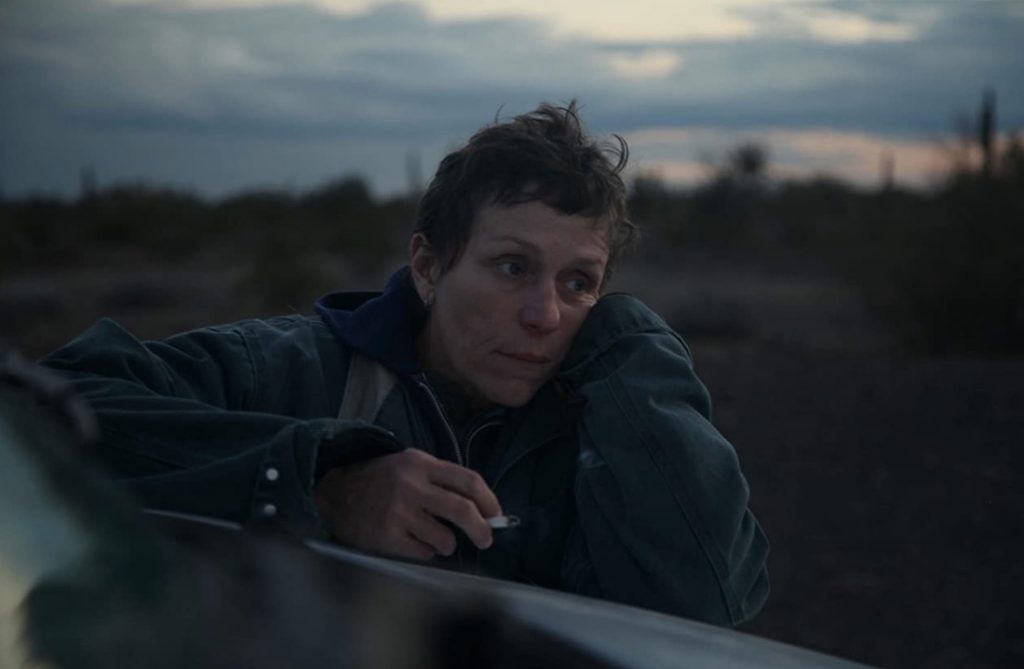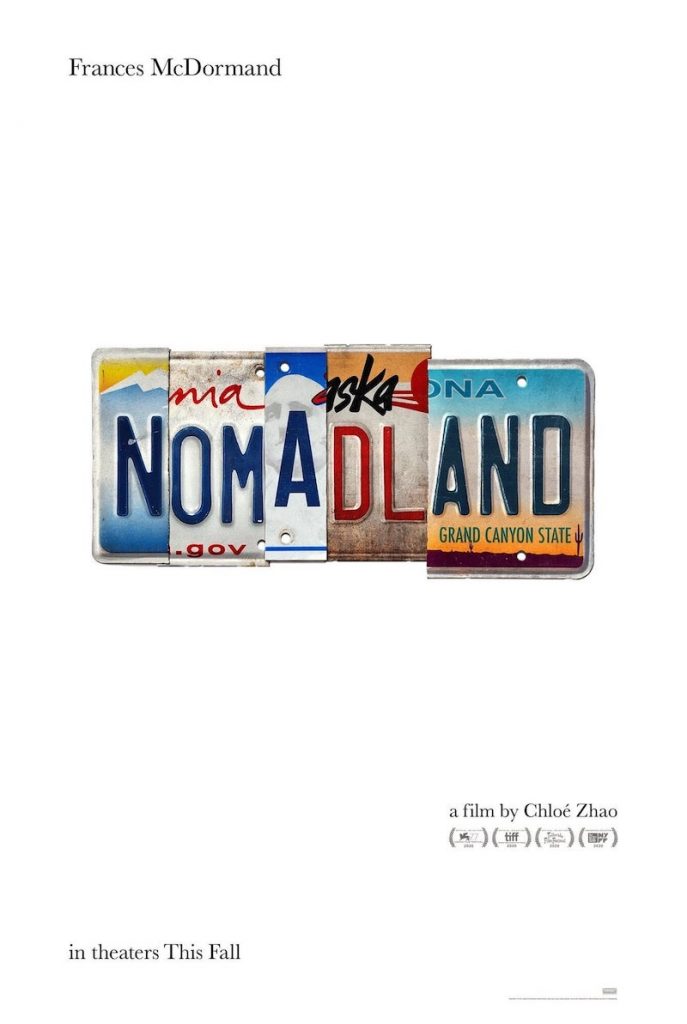NOMADLAND (2020)
A woman in her sixties, after losing everything in the Great Recession, embarks on a journey through the American West, living as a van-dwelling modern-day nomad.

A woman in her sixties, after losing everything in the Great Recession, embarks on a journey through the American West, living as a van-dwelling modern-day nomad.


Home. Is it just a word, or is it something you carry within you?
Nomadland is writer-director Chloe Zhao’s third feature following her moving western drama The Rider (2017) and debut Songs My Brothers Taught Me (2015). She’s already cemented herself as one of the most exciting new filmmakers working today. Loosely adapted from Jessica Buckley’s non-fiction book Nomadland: Surviving America in the Twenty First Century, it follows sixty-something Fern (Frances McDormand) as she travels across the American West after losing her home, her husband, and almost everything she owns in the recession. Going from job to job and living out the back of her van, she lives as a true Nomad, and along the way tells a spiritual and touching story which will speak to anyone who’s ever grieved or found themselves in a rut that’s begun to define the economic landscape of the 21st-century.
Fern is a childless widow who spent most of her life living in a Nevada mining town, seemingly built by the company she and her husband worked for. However, when the company shut up shop, so did the town. The zip code was even discontinued. But Fern isn’t homeless, insisting “I’m just houseless.” She does shifts in an Amazon warehouse, kitchens, and campsites, and in-between meets characters played by real-life Nomads; some of whom have lost children to suicide, have considered suicide themselves, or are battling through terminal illnesses. Even with all this pain and loss, the Nomads form a tight-knit community and look after one another. “See you down the road,” they tell each other—whether that be days, years, or even lifetimes.

Although Frances McDormand shines in what might be one of the best performances of her career, the rest of the cast step up so well they perfectly blend with McDormand’s stunning naturalism. The lines between actor and amateur and feature film and documentary are often blurred (as was the case with The Rider, which featured real-life rodeo riders), with frequent focusses on one of the Nomads as they share their life story with Fern.
These close-ups are contrasted with the magnificent shots of the US landscape (some of which are quite literally breathtaking) courtesy of cinematographer Joshua James Richards, who worked with Zhao on The Rider as well as on Francis Lee’s God’s Own Country (2017), where he similarly captured the natural beauty of the Yorkshire Dales. The film’s connection with nature is beautifully and seamlessly edited into the narrative, creating an impression the human psyche and soul is itself a landscape. When we battle with loss, we’re swimming against the violent waves of grief; and when we see a storm coming, we look to the person next to us and see that they are, first and foremost, a fellow human being.
One night when Fern goes star gazing on a tour with David (a fellow Nomad who takes a particular shine to Fern), he speaks about how we are all made of star dust and how it’s taken however many years for the light from the stars they are looking at to reach us. This sort of dialogue is often shoehorned into all sorts of films as faux profoundness, but in Nomadland it feels authentic and wholehearted. In fact, audiences will struggle to find any aspect of the film that isn’t.

Nomadland does well not glorify the Nomad lifestyle. As idealistic as it may seem at times, Fern spends most of her time alone, solemnly cooking modest meals on a makeshift hob, shitting into a bucket, and flickering a single sparkler on New Years Eve, always just one flat tyre away from being in serious trouble. There’s a certain neutrality to Nomadland; it’s only subtly political without being didactic. Other than a fleeting glimpse of a Confederate flag tattoo, there’s no mention of contemporary politics. Instead, we get portraits of the crushing struggle against the ruthless pressures of capitalism, anchoring us to Fern’s experience to give audiences an emotional connection to the wider picture.
Ludovico Einaudi’s beautiful soundtrack (who also composed for This is England and the upcoming The Father) perfectly underscores the wistful, soulful nature of the film as we wander the American West alongside Fern. It’s composited into the movie by Zhao herself, with one particularly satisfying moment coming in the form of Einaudi’s score building to a crescendo against the backdrop of stunning landscapes, then suddenly cutting as Fern slams shut her van door.
Nomadland is the film of the year so far. Its universal emotional and spiritual depth cannot be overstated, as it cuts to the core of what it means to be human, to the point where even death isn’t something to be feared. And why would it be when we are given the assurance that we’ll see the ones we love again, somewhere along the line?
See you down the road…
USA • GERMANY | 2020 | 108 MINUTES | 2.39:1 | COLOUR | ENGLISH


director: Chloé Zhao.
writer: Chloé Zhao (based on the novel ‘Nomadland: Surviving America in the Twenty-First Century’ by Jessica Bruder).
starring: Frances McDormand, David Strathairn, Linda May, Charlene Swankie & Bob Wells.
